The Tea Party has emerged as a political force on domestic issues, especially the national debt and the size and role of the federal government. Republican supporters of the Tea Party movement also have a distinct approach to national security and America’s role in the world. Tea Party Republicans favor an assertive foreign policy, are strong supporters of Israel and take a hard line against illegal immigration, according to surveys conducted this year by the Pew Research Center for the People & the Press:
Peace Through Strength
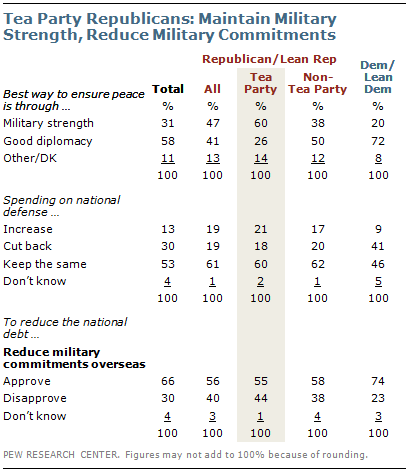
Among all Republicans and Republican-leaning independents, 40% agree with the Tea Party movement. For more on the demographics of GOP Tea Party supporters see “Obama Loses Ground in 2012 Reelection Bid,” July 28, 2011.
Republicans and Republican-leaning independents who agree with the Tea Party are far more likely than other Republicans or Democrats to support the Reagan-era principle of “peace through strength.” And there is broad support among Tea Party Republicans, as well as non-Tea Party Republicans, for maintaining defense spending at current levels. By contrast, far more Democrats and Democratic-leaning independents want to cut back defense spending.
Yet a majority of Tea Party Republicans and Republican leaners (55%) also approve of reducing military commitments overseas to reduce the budget deficit and the size of the nation’s debt. On this issue, their opinions differ little from Republicans and leaners who do not agree with the Tea Party movement (58%). Among Democrats and Democratic leaning independents, 74% approve of cutting back on military commitments to reduce the national debt.
Middle East: Strong Support for Israel, Criticism of Obama
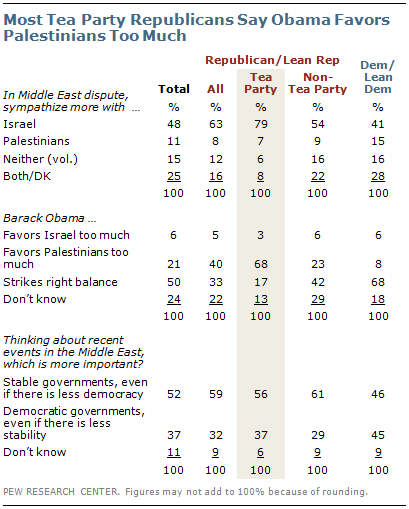
U.S. policy in the Middle East recently emerged as a campaign issue, with Texas Gov. Rick Perry criticizing Barack Obama’s handling of the Israel-Palestinian dispute.
In late May, Republicans and GOP leaners who agree with the Tea Party movement overwhelmingly sympathized more with Israel than the Palestinians. Fully 79% sympathized more with Israel, compared with 54% of non-Tea Party Republicans and 41% of Democrats and Democratic leaners.
The differences were even starker in views of Obama’s handling of this issue: 68% of Tea Party Republicans said Obama favors the Palestinians too much, compared with just 23% of non-Tea Party Republicans and 8% of Democrats.
There has been greater partisan agreement in opinions about the political changes that are affecting many countries in the Middle East. In early March, amid pro-democracy protests in several Middle Eastern countries and shortly after Hosni Mubarak stepped down as Egypt’s president, 52% of the public said it was more important to have stable governments in the Middle East, even if there were less democracy; 37% said democratic governments are more important even if there were less democracy.
Majorities of Tea Party Republicans (56%) and non-Tea Party Republicans (61%) said stable governments were more important, even if it meant less stability. Democrats and Democratic leaners were more divided: 46% said stable governments were more important, even if it meant less democracy, while 45% said democracy was more important, even it meant less stability.
Free Trade Agreements, China
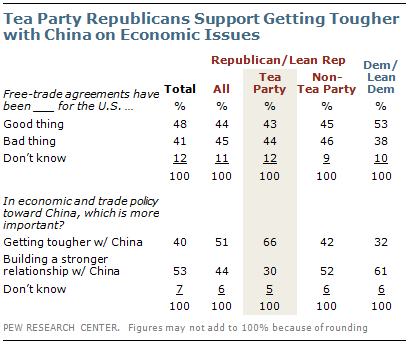
Like the general public, Republican and Republican-leaning supporters of the Tea Party movement are divided over the impact of free trade agreements: 43% say free trade agreements have been a good thing for the U.S. while 44% see them as a bad thing. Republicans who do not agree with the Tea Party also are divided; a narrow majority of Democrats and Democratic-leaning independents (53%) say trade agreements have had a positive impact.
Tea Party Republicans are much more supportive of taking a harder line with China in economic policy than are other Republicans or Democrats. Two-thirds (66%) say it is more important to get tougher with China on economic issues; just 30% say it is more important to build a stronger relationship with China on these issues. About four-in-ten non-Tea Party Republicans (42%) and 32% of Democrats and Democratic leaners prioritize getting tougher with China.
Illegal Immigration
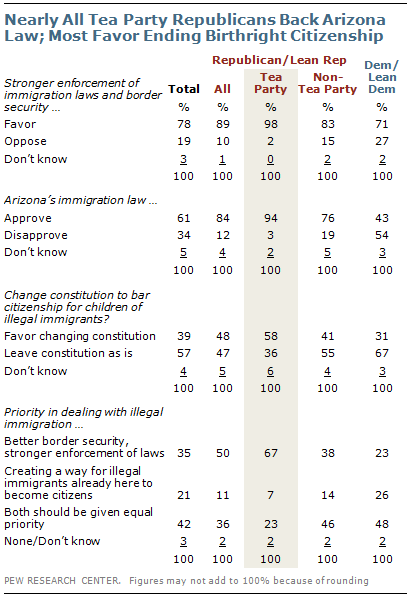
Most Americans support stricter enforcement of immigration laws and tighter border security. But among Tea Party Republicans support for tougher immigration measures is virtually universal – 98% favor stronger enforcement of immigration laws.
Nearly as many (94%) favor Arizona’s tough immigration law, which is tied up in court. The law requires police to verify the legal status of someone they have already stopped or arrested if they suspect that the person is in the country illegally. Nearly six-in-ten Tea Party Republicans (58%) favor changing the constitution to bar citizenship for children born in the United States to illegal immigrants. Majorities of Democrats (67%) and non-Tea Party Republicans (55%) oppose changing the constitution for this purpose.
The public generally supports a two-fold approach to illegal immigration: a 42% plurality says the priority should be both better border security and stronger enforcement of immigration laws and creating a way for illegal immigrants who are already here to become citizens if they meet certain requirements. Nearly half of Democrats (48%) and non-Tea Party Republicans (46%) say that better border security and finding a way for people here illegally should be given equal priority.
But a substantial majority of Tea Party Republicans (67%) say better border security and stronger enforcement of existing laws should be the primary priority; just 23% favor a dual focus, with equal priority given to tougher security measures and a path to citizenship.
Afghanistan: Support for Troop Presence, Doubts about the Future
In June, shortly before President Obama announced his timetable for withdrawing U.S. troops from Afghanistan, a majority of Tea Party Republicans (55%) favored maintaining U.S. troops in the country until the situation has stabilized.
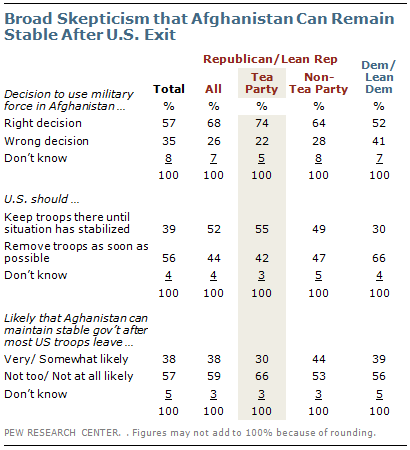
Still, 42% supported withdrawing U.S. forces as soon as possible – double the percentage that did so just a year earlier (21%). For more, see “Record Number Favors Removing U.S. Troops from Afghanistan,” June, 21, 2011.
Across the political spectrum, there was little optimism that Afghanistan can maintain a stable government after most U.S. troops leave the country.
Just 30% of Tea Party Republicans said it is likely that Afghanistan can maintain a stable government after most U.S. forces exit, as did 39% of Democrats and 44% of non-Tea Party Republicans.
After Obama’s announcement, the Pew Research Center and The Washington Post conducted a survey about the pace of troop withdrawal from Afghanistan. A plurality of Americans (44%) said Obama was handling the withdrawal of combat troops from Afghanistan about right, while 29% said he was not removing them quickly enough, and 14% thought he was removing them too quickly.
The survey had no measure of Tea Party support, but Republicans generally were divided over Obama’s plan for drawing down U.S. forces: 32% said Obama was not removing the troops quickly enough, 28% said he was removing them too quickly, and 25% said he was handling this about right.
For more
Much of the data in this report came from Pew Research’s political typology, which sorts Americans into cohesive groups based on values, political beliefs, and party affiliation. For more, see “Beyond Red vs. Blue: The Political Typology” May 4, 2011.
Data also came from the following other reports: “Obama Draws More Confidence than GOP Leaders on Deficit,” Sept. 26, 2011; “Views of Middle East Unchanged by Recent Events,” June 10, 2011; “Record Number Favors Removing U.S. Troops from Afghanistan,” June 21, 2011; “More Blame Wars than Domestic Spending or Tax Cuts for Nation’s Debt,” June 7, 2011; “Public Favors Tougher Border Controls and Path to Citizenship,” Feb. 24, 2011.